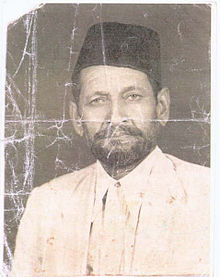- Nakhuda
-
Nākhudā (Persian: ناخدا) (when also written Nakhodazadeh, Nakhoda, Nakhodeh, Nakhodaei, Nakhooda, and Nacoda) is a term originating from the Persian language literally meaning Captain. Derived from nāv boat (from Old Persian) + khudā master, from Middle Persian khutāi a 'master of a native vessel' or 'Lord of the Ship'.
Historically, people with this epithet are Muslim and Kamili Jewish ship owning merchants of Persian origin, known to have crossed the Persian Gulf to trade in other coastal areas of the world.
Besides trade, religious persecution faced by Sunni Muslims, Jews and Zoroastrians under the reign of the Safavid Dynasty in Persia is of great historical relevance to the migration of many Nakhudas. Ship-owners; the Nakhudas were in an advantageous position to flee this persecution and seek refuge in neighbouring countries escaping via the Persian Gulf.
India in particular was a prime attraction for both migrant traders and refugees due to its provident nature. This is as it offered economic natural resources, a luxuriant lifestyle for the wealthy, and most importantly, as a nation India was known for the religious freedom prevalent in her society. Gujarat was particularly attractive due to its proximity to Persia and its large Arabian Sea coastline and ports. Gujarat also had a long history of both Persian and foreign settlements dating back to pre-islamic times particularly Surat, where in the 16th century, Parsi, Jewish (See Baghdadi Jews), Arab (see Chavuse) and Armenian (see Armenians in India) communities existed. Surat was therefore well known to Persians. Many Nakhudas can be found in India today amongst the ethnic minorities of the Parsi's, Bene Israel, Pathans (see Pathans of Gujarat) and Musalmans. Like other foreign communities in India they have inter-married with Indian Muslims and adopted the customs of the locals; resulting in an Indo-Persian culture of their own like the Parsi community.
The West Indian coastal towns close to the Arabian Sea of Tadkeshwar and Randher neighbouring the famous port of Surat, in particular have a strong history of Nakhudas dating back to the Mughal and the Safavid Dynasty.
Many foreign Muslim communities are known to have settled in Gujarat and Northern India (both part of the Mughal Empire) during Mughal times and there was much movement of people both by overland and sea. It would seem the Nakhudas that originate from Tadkeshwar most probably arrived in Gujarat from Persia by sea during the rule of Persia's Safavid Dynasty (1502–1722), possibly from Hormozgan Province as Surat use to have regular sea borne to and fro traffic of merchant vessels from Bandar Abbas, and also because many Nakhudas and Sunni Muslims are still found in this area and other areas of coastal Iran. Like many Sunnis that faced persecution under the Safavid Dynasty, they immigrated to other Islamic lands - India at that time was under Muslim rule and Gujarat was a particular hotspot for trade and business besides already having Persian trading communities. It would seem that the Nakhudas originally settled in Rander (close to Surat) which was the most important port of Gujarat at that time, the few that arrived intermarried and adopted the use of Gujarati as their mother tongue. Rander was attacked and ransacked by the Portuguese and the British. Trade in the Indian Ocean and the Arabian Sea was also disrupted by colonial powers. Having suffered economic losses, it is probable that a few Nakhudas moved in-land and settled in Tadkeshwar sometime in the late 18th century. After buying land they became land owners and thus fully integrated themselves into the local Gujarati populace. Today they are one of the dominant and wealthiest families in Takreshwar. The Nakhudas in Tarkeshwar and Rander are also Hanafi and follow the Ulama of Deoband. It is interesting to note that Tadkeswar also has a Parsi Street and previously had a small Parsi community. Many of the Nakhudas from Tadkeshwar have immigrated from India during and after the British Raj - Nakhudas can be found in Iran, Reunion, South Africa, Australia, Saudi Arabia, United Kingdom, USA, Pakistan, Canada,Barbados West Indies and other parts of Africa.
Today, the descendants of this lineage the Nakhudas of Tadkeshwar resemble Persian peoples to varying degrees. Many Nakhudas look distinct and have light skin, green or even blue eyes, reflecting their diverse Persian ethnic origins and to an extent verifying their history. The Nakhudas resident in Tadkeshwar and Rander, and those who have moved from there to other parts of the globe are traditionally Hanafi and adhere to the Deobandi way.
Despite historical persecution, Nakhudas however remain in the Islamic Republic of Iran today, mainly in Hormozgan Province and Baluchistan Province. Many have now re-located from coastal areas such as Qabr-e-Nakhuda, Naghdeh, Nakbl Nakuda, Nakdar and Nakhleh Nakhuda to the country's capital Tehran and other major cities such as Shiraz, Ishphan and Tabriz.
India harbours a Nakhoda Mosque, a Nakhuda Chowk, Nakhuda Mohalla and also a Nakhuda Street. Whilst, films associated with the general meaning of the epithet Nakhuda have also been produced in both India and Iran - 'Nakhuda' and 'Nakhoda Khorshid'.
The popular bar by the name of [Nakhuda], its interior designed as a Ship cabin, is a great place to visit in Dubai, U.A.E.
- http://dsal.uchicago.edu/cgi-bin/philologic/getobject.pl?c.1:1:637.hobson
- http://jstor.org/sici?sici=0022-4995(2000)43%3A1%3C34%3ANANSMI%3E2.0.CO%3B2-Q -
- http://iranica.com/articles/v11f4/v11f4019.html
- http://www.jstor.org/pss/2058032
- Al-Hind, the Making of the Indo-Islamic World By André Wink
Categories:- Persian loanwords
- Persian words and phrases
- Ethnic groups in Asia
- Persian communities outside of Iran
Wikimedia Foundation. 2010.

